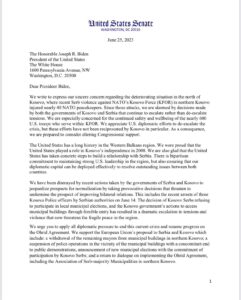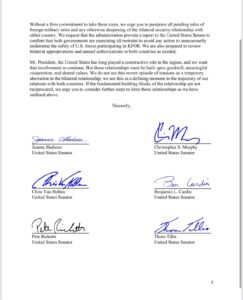In the hallowed halls of the United States Senate, where lofty promises and impassioned speeches are meant to shape the course of history, a disturbing trend is taking root. Despite the long-standing partnership and alliance between Kosovo and the United States, the U. S., senators have fallen deafeningly silent on the real source of escalators tensions in northern Kosovo – Serbia.
It is no secret that the United States has recently undergone a significant shift in its foreign policy, throwing its weight behind Serbia, a country aligned with the Kremlin. Following the agreement signed in September 2022 with the Russian Federation, Serbia has shamelessly aligned its foreign policy with Russia, even as the world recoiled in horror at Russia’s full-scale military invasion of Ukraine launched on February 22, 2022. Yet, the United States now seems determined to cosy up to Serbia, responding to and supporting Serbia’s interests against the Republic of Kosovo, perhaps in a misguided attempt to detach Serbia from its unholy alliance with Russia.
Let us not forget that Serbia, unlike the majority of the international community, has refrained from invoking Western-imposed sanctions against the Russian Federation following its brazen act of aggression. This lack of condemnation speaks volumes about Serbia’s priorities and its willingness to align itself with those who flout international law. And what does this say about the U. S., senators, who turn a blind eye to Serbia’s transgressions and ignore the very real threat it poses to the stability and security of the Balkan region?
The situation in northern Kosovo has been simmering with tension for some time now. Last year, Kosovan Serbs, under the dictation of Belgrade, boycotted local institutions in response to the determination by the Republic of Kosovo that they could not register their vehicles with Serbia’s regulated license plates while residing in Kosovo. These license plates are nothing more than a clear symbol of Serbia’s defiance of Kosovo’s statehood. Rather than address this issue diplomatically, Serbia resorted to orchestrating a campaign of obstruction, further exacerbating the tensions.
When the then-President of Kosovo announced fresh elections to be held in December, militia factions backed by Belgrade attacked the local election commission office, forcing the postponement of the elections until April. The situation in the north remained tense, with the arrest of Dejan Pantic, a former Kosovan police officer involved in allegations of terrorism and endangering the constitutional order of the Republic of Kosovo. Under the direction of Belgrade, Kosovan Serbs and other militia factions erected roadblocks throughout northern Kosovo, bordering Serbia.

Foreign and national intelligence sources have whispered and indicated that Serbs were organizing an attempt to declare an autonomous republic of Serbia within northern Kosovo. Despite international pressure against any such response, Prishtina, the capital of Kosovo, prepared its armed forces to intervene and restore the rule of law and justice in its northern territory. President Aleksandar Vucic of Serbia, seeing Prishtina’s determination, walked out of Belgrade to allegedly meet with fellow Serbs in Raska, Serbia, bordering Kosovo.
Prishtina’s unwavering resolve to restore law and order in northern Kosovo forced President Vucic to retreat from his interim demand that Kosovo either agree to and implement a Serb Dominated Municipal Association or face the perpetuation of barricades. As Vucic met with his militia factions in Raska, the Serbs eventually decided to remove their roadblocks. However, the international community, using coercive tactics, “convinced” the Kosovan prosecutor to release Dejan Pantic into house arrest, despite his alleged terrorist activities in the eyes of Kosovo authorities.

Negotiations, initially held in Brussels, were later moved to Ohrid, North Macedonia, in an attempt to find a resolution to the ongoing tensions in northern Kosovo. However, despite the efforts of international mediators, the talks have been marred by a lack of genuine commitment from Serbia to address the underlying issues.
Meanwhile, the U. S., senators, who have a responsibility to uphold democratic values and champion the cause of justice, have chosen to remain silent on Serbia’s role in fuelling tensions in northern Kosovo. This silence is not only a blatant betrayal of the U. S., longstanding alliance with Kosovo but also a failure to uphold the principles of human rights, self-determination, and respect for international borders.
The United States, as a global leader, should be at the forefront of promoting stability and peace in the Balkan region. Instead, the U. S., senators’ inaction sends a dangerous message that Serbia’s aggressive behaviour and disregard for international norms will go unchecked. This not only undermines Kosovo’s sovereignty and the progress made since its declaration of independence in 2008 but also jeopardizes the fragile peace in the region.
It is essential that the U. S., senators reevaluate their stance and prioritize the interests of justice, democracy, and stability. They must condemn Serbia’s actions, hold it accountable for its provocative behaviour, and support Kosovo’s efforts to maintain law and order within its own borders. Only through a firm and united stance can we hope to resolve the tensions in northern Kosovo and ensure a peaceful future for all its inhabitants.
As a concerned citizen of Kosovo, I believe that we must demand that the U. S., senators fulfil their duty to represent our values and interests on the international stage. We cannot stand idly by while the U. S., allies are betrayed, and the principles the U. S., hold dear are disregarded. It is time for the U. S., senators to speak out, take decisive action, and reaffirm the U. S., commitment to a free, sovereign, and united Kosovo.
The world is watching, and history will judge the senators by their response to this critical moment. Let us hope they choose to stand on the right side of history and support the aspirations of the people of Kosovo for peace, justice, and self-determination

